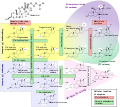Pregnenolone
Pregnenolone[edit]

Pregnenolone is an endogenous steroid hormone that serves as a crucial precursor in the biosynthesis of several other steroid hormones. Derived from cholesterol, it plays a fundamental role in the steroidogenic pathway and contributes to a myriad of physiological processes in the body.
Chemistry and Synthesis[edit]
Pregnenolone's chemical classification categorizes it as a steroid, with its structure being based on a cyclopentanoperhydrophenanthrene ring. Its synthesis commences in the mitochondria of steroid-producing cells, where cholesterol undergoes conversion to pregnenolone through the action of the enzyme cytochrome P450scc (cholesterol side-chain cleavage enzyme).
Role and Function[edit]
As a prohormone, pregnenolone is vital for the synthesis of various hormones:
- Progesterone: A key hormone involved in the menstrual cycle, pregnancy, and embryogenesis in humans.
- Corticosteroids: Hormones related to the immune response and regulation of inflammation.
- Mineralocorticoids: Hormones that regulate salt and water balance.
- Androgens and estrogens: The main sex hormones in males and females, respectively.
Besides serving as a precursor for other hormones, recent studies suggest that pregnenolone may have its own set of neuroprotective properties, and its potential role in memory and cognitive functions is being explored.
Clinical Significance[edit]
Alterations in pregnenolone levels can indicate disruptions in the steroidogenic pathway. Some conditions associated with pregnenolone variations include:
- Congenital Adrenal Hyperplasia (CAH): A group of inherited disorders affecting the adrenal glands.
- Polycystic Ovary Syndrome (PCOS): A hormonal disorder causing enlarged ovaries with small cysts on the outer edges.
- Certain types of adrenal tumors.
Additionally, pregnenolone is sometimes used in supplemental form to address fatigue, enhance memory, or alleviate symptoms of arthritis, though scientific evidence supporting these uses is limited.
Safety and Side Effects[edit]
Like all hormones, balance is key. While the body tightly regulates pregnenolone production, supplemental intake might lead to side effects such as:
- Insomnia
- Overstimulation
- Headaches
- Heart palpitations
Before using pregnenolone supplements, it is advisable to consult with a healthcare professional to discuss potential risks and benefits.
See Also[edit]
References[edit]
<references/>
- Miller, W. L. (2013). The Synthesis and Metabolism of Pregnenolone. Journal of Steroid Biochemistry.
- Johnson, M. (2018). Pregnenolone: Its Effects and Uses. Health Perspectives Quarterly.
Ad. Transform your life with W8MD's Budget GLP-1 injections from $75


W8MD offers a medical weight loss program to lose weight in Philadelphia. Our physician-supervised medical weight loss provides:
- Weight loss injections in NYC (generic and brand names):
- Zepbound / Mounjaro, Wegovy / Ozempic, Saxenda
- Most insurances accepted or discounted self-pay rates. We will obtain insurance prior authorizations if needed.
- Generic GLP1 weight loss injections from $75 for the starting dose.
- Also offer prescription weight loss medications including Phentermine, Qsymia, Diethylpropion, Contrave etc.
NYC weight loss doctor appointmentsNYC weight loss doctor appointments
Start your NYC weight loss journey today at our NYC medical weight loss and Philadelphia medical weight loss clinics.
- Call 718-946-5500 to lose weight in NYC or for medical weight loss in Philadelphia 215-676-2334.
- Tags:NYC medical weight loss, Philadelphia lose weight Zepbound NYC, Budget GLP1 weight loss injections, Wegovy Philadelphia, Wegovy NYC, Philadelphia medical weight loss, Brookly weight loss and Wegovy NYC
|
WikiMD's Wellness Encyclopedia |
| Let Food Be Thy Medicine Medicine Thy Food - Hippocrates |
Medical Disclaimer: WikiMD is not a substitute for professional medical advice. The information on WikiMD is provided as an information resource only, may be incorrect, outdated or misleading, and is not to be used or relied on for any diagnostic or treatment purposes. Please consult your health care provider before making any healthcare decisions or for guidance about a specific medical condition. WikiMD expressly disclaims responsibility, and shall have no liability, for any damages, loss, injury, or liability whatsoever suffered as a result of your reliance on the information contained in this site. By visiting this site you agree to the foregoing terms and conditions, which may from time to time be changed or supplemented by WikiMD. If you do not agree to the foregoing terms and conditions, you should not enter or use this site. See full disclaimer.
Credits:Most images are courtesy of Wikimedia commons, and templates, categories Wikipedia, licensed under CC BY SA or similar.
Translate this page: - East Asian
中文,
日本,
한국어,
South Asian
हिन्दी,
தமிழ்,
తెలుగు,
Urdu,
ಕನ್ನಡ,
Southeast Asian
Indonesian,
Vietnamese,
Thai,
မြန်မာဘာသာ,
বাংলা
European
español,
Deutsch,
français,
Greek,
português do Brasil,
polski,
română,
русский,
Nederlands,
norsk,
svenska,
suomi,
Italian
Middle Eastern & African
عربى,
Turkish,
Persian,
Hebrew,
Afrikaans,
isiZulu,
Kiswahili,
Other
Bulgarian,
Hungarian,
Czech,
Swedish,
മലയാളം,
मराठी,
ਪੰਜਾਬੀ,
ગુજરાતી,
Portuguese,
Ukrainian



